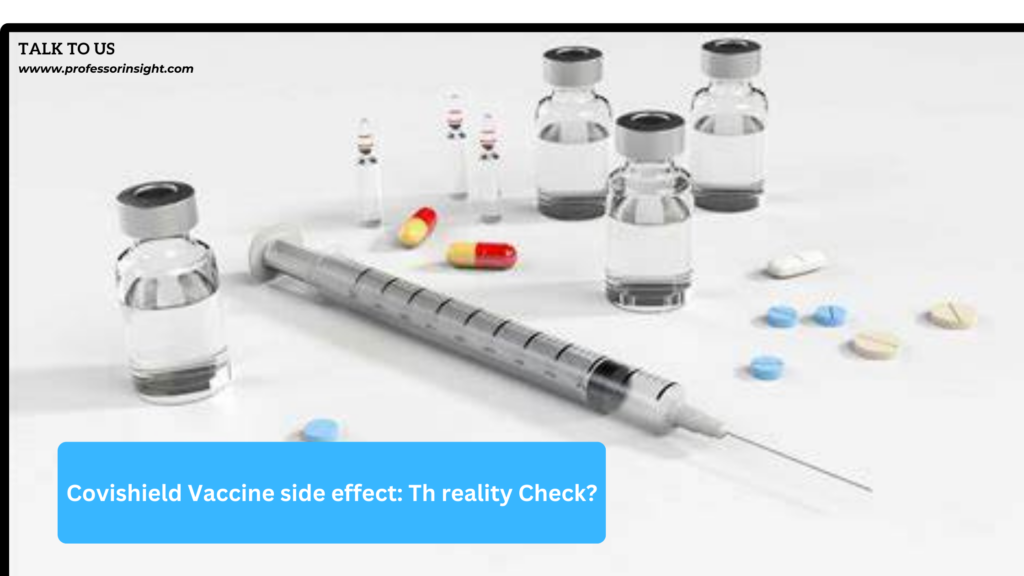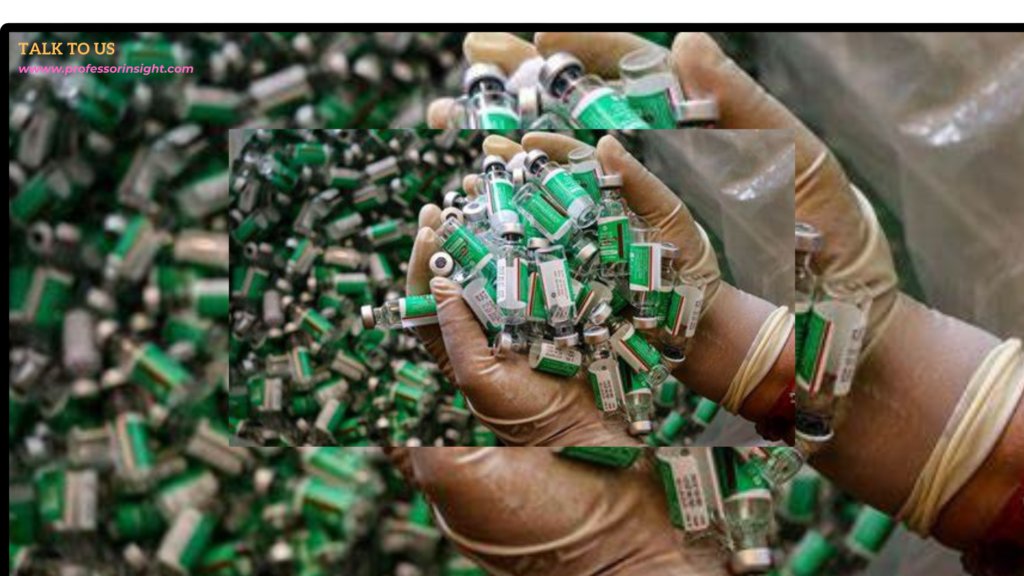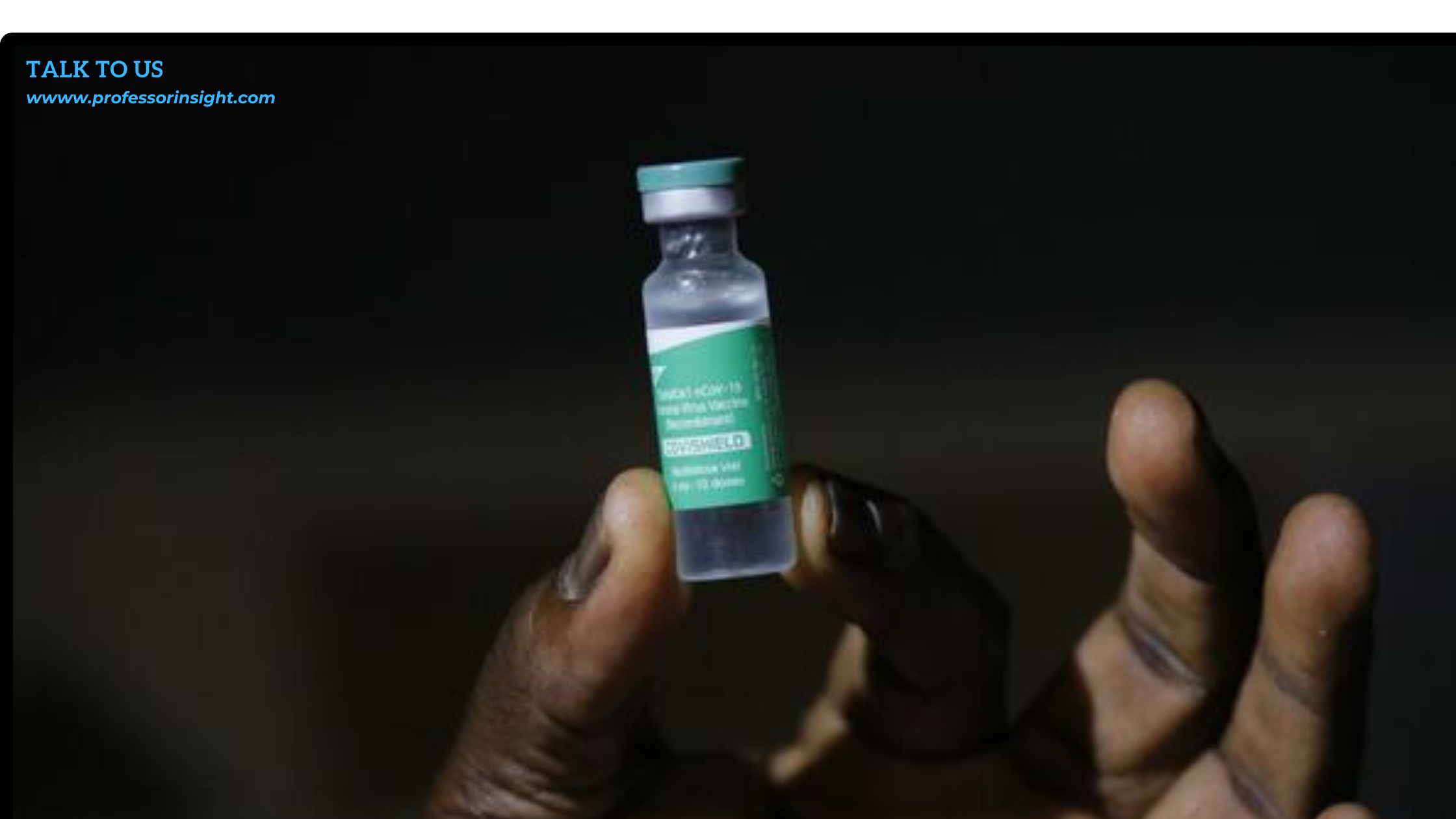In India: Indian are getting panic over Covishield vaccine who took over the year now seeing side effects in many countries. The AstraZeneca vaccine, which was sold in India as Covishield, has admitted to an adverse event called Thrombosis with Thrombocytopenia Syndrome’ or TTS in very rare cases has led to deluge of social media posts and a growing sense of paranoia among people. By looking at the data from the UK and the European Union, the Global Advisory Committee on Vaccine Safety assessed that the risk was low. The committee consists of independent vaccine and other domain experts. It advises the World Health Organization on vaccine safety. Thrombosis with Thrombocytopenia Syndrome (TTS) is a rare yet serious condition linked to certain COVID-19 vaccines. Overall peoples should not get panic about the Covishield vaccine.

What can be cause of Covishield vaccine:
The Covishield vaccine, also known as the Oxford-AstraZeneca vaccine, is a viral vector vaccine designed to protect against the COVID-19 virus caused by the SARS-CoV-2 virus. are but serious side effects, such as allergic reactions or blood clotting disorders, have been reported following vaccination with Covishield, prompting regulatory agencies to closely monitor the vaccine’s safety profile. Despite these rare adverse events, the benefits of Covishield vaccination in preventing COVID-19 outweigh the risks for most people. Once the vaccine is administered, the adenovirus vector enters human cells and delivers the genetic material encoding the spike protein of the SARS-CoV-2 virus. He vaccine works by using a harmless virus, in this case, a weakened version of a common cold virus called adenovirus, as a vector to deliver genetic material from the SARS-CoV-2 virus into the body. The Covishield vaccine has demonstrated efficacy in clinical trials, showing high levels of protection against symptomatic COVID-19, severe disease, and hospitalization. However, like all vaccines, Covishield may cause side effects in some individuals. Common side effects include pain or swelling at the injection site, fatigue, headache, muscle or joint pain, chills, fever, and nausea. These side effects are usually mild to moderate in severity and resolve within a few days. The Covishield vaccine induces immunity against COVID-19 by leveraging a viral vector platform to deliver genetic material encoding the spike protein of the SARS-CoV-2 virus, thereby eliciting an immune response that provides protection against future infection.
Effectiveness Factor of Covishield vaccine:
Safety Profile: Extensive clinical trials and real-world data have demonstrated the safety and efficacy of the Covishield vaccine. Like all vaccines, it may cause mild-to-moderate side effects such as pain at the injection site, fatigue, headache, muscle pain, chills, fever, and nausea, which are generally transient and resolve within a few days. Serious adverse events are rare.
Spike Protein Production: Once the ChAdOx1 vector carrying the genetic material enters human cells, it instructs the cells to produce the spike protein of the SARS-CoV-2 virus. The spike protein is then displayed on the surface of the cells.
Immune Response: This recognition initiates a series of immune responses, including the production of antibodies and activation of T cells, aimed at neutralizing, and eliminating the perceived threat.
Two-Dose Regimen: The Covishield vaccine is typically administered as a two-dose regimen, with the second dose given several weeks after the first dose. The interval between doses allows for the priming of the immune system with the initial dose and the boosting of the immune response with the second dose, resulting in enhanced protection against COVID-19.
What is the key Difference between Covaxin and Covishield Vaccine?
There are some key Difference between Covaxin Vaccine and Covishield Vaccine as given below:
| Covaxin Vaccine | Covishield Vaccine |
| Covaxin is an inactivated virus vaccine developed by Bharat Biotech and the Indian Council of Medical Research, | while Covishield is a viral vector vaccine developed by AstraZeneca in collaboration with the University of Oxford, manufactured by the Serum Institute of India. |
| Covaxin generally requiring standard refrigeration temperatures (2-8°C), | Covishield being more stable at standard refrigerator temperatures, making it more convenient for distribution and storage. |
| Both vaccines require a two-dose regimen, with Covaxin’s second dose typically given 4-6 weeks after the first dose, | , and Covishield’s second dose given 4-12 weeks after the first dose. |
| Covaxin uses killed SARS-CoV-2 virus particles to trigger an immune response, | while Covishield uses a weakened version of a common cold virus (adenovirus) as a vector to deliver genetic material encoding the spike protein of the SARS-CoV-2 virus. |
| Efficacy rates vary, with Covaxin showing reported efficacy rates ranging from around 70% to 81%, | while Covishield has reported efficacy rates ranging from around 70% to over 90%. |

Is treatment available of Covishield Vaccine side effect?
Yes’ treatment is available for side effects of the Covishield vaccine. Most side effects are mild and resolve on their own within a few days. If symptoms persist or worsen, medical attention may be needed. Common side effects such as pain at the injection site, fatigue, headache, muscle pain, chills, fever, and nausea can be managed with rest, hydration, and over-the-counter medications like acetaminophen or ibuprofen. Severe allergic reactions are rare but can be treated with immediate medical attention,
Also Reads – The Reality of Goldy Brar murdered: Know the truth
Is Canada accepting Covishield vaccine?
Yes Canada is accepting Covishield vaccine since 2020.
Is Covishield recognized by WHO?
Yes, Covishield is recognized by the World Health Organization (WHO). It has received emergency use listing (EUL) status from the WHO, indicating that it meets the organization’s standards for safety, efficacy, and quality. This recognition facilitates global access to Covishield and enables its inclusion in vaccination campaigns worldwide.
What is full form of WHO?
WORLD HEALTH ORGANIZATION is the full form of WHO.
Covishield side effect latest new?
Reads The full article to know the latest update about the Covishield vaccine and their side effect
click the below link.
Company name OF Covishield Vaccine?
Covishield is a viral vector vaccine developed by AstraZeneca in collaboration with the University of Oxford, manufactured by the Serum Institute of India.
Was Covishield approved by WHO?
Yes’ Covishield was approved by WHO.
How does COVID-19 spread?
COVID-19 primarily spreads through respiratory droplets when an infected person coughs, sneezes, or talks. It can also spread by touching surfaces contaminated with the virus and then touching the face.
What are the key symptoms of COVID-19?
Common symptoms of COVID-19 include fever, cough, shortness of breath, fatigue, muscle or body aches, headache, loss of taste or smell, sore throat, congestion or runny nose, nausea or vomiting, and diarrhoea.
How effective is the COVID-19 vaccine?
COVID-19 vaccines have been shown to be highly effective in preventing severe illness, hospitalization, and death caused by COVID-19. Different vaccines may have varying efficacy rates, but all authorized vaccines provide significant protection against the virus.
herd immunity?
Herd immunity occurs when a large portion of a population becomes immune to a disease, either through vaccination or prior infection, thereby providing indirect protection to those who are not immune. Achieving herd immunity is crucial in controlling the spread of infectious diseases like COVID-19.
How long does COVID-19 immunity last after infection or vaccination?
It is currently believed that immunity acquired through vaccination or natural infection may wane over time, but booster doses and ongoing monitoring are strategies to maintain protection.
What are the variants of concern for COVID-19?
Variants of concern (VOCs) are strains of the virus that have mutations that may affect their transmissibility, severity, or ability to evade immunity. Examples include the Delta, Alpha, Beta, and Gamma variants.
How can I protect myself and others from COVID-19?
You can protect yourself and others from COVID-19 by getting vaccinated, wearing masks in crowded or indoor settings, practicing good hand hygiene, maintaining physical distance from others, avoiding large gatherings, and following public health guidelines.
What is the difference between isolation and quarantine?
Isolation is the separation of sick individuals with a contagious disease from those who are healthy, while quarantine is the separation of individuals who may have been exposed to a contagious disease but are not yet symptomatic to prevent the spread of the disease.
Can I travel safely during the COVID-19 pandemic?
Traveling safely during the COVID-19 pandemic involves assessing the risks associated with travel, following travel advisories and restrictions, getting vaccinated if eligible, wearing masks in transit and crowded areas, practicing hand hygiene, and adhering to quarantine or testing requirements as needed.
When will the COVID-19 pandemic end?
It depends on various factors, including effective treatments, public health measures, and global cooperation, widespread vaccination. While progress has been made, the timeline for ending the pandemic remains uncertain. Continued efforts to control the virus and mitigate its impact are essential.




Pingback: CBSE Board Result 2024 for 10th and 12th: Live Update - professor insight
Pingback: Surprisingly fastest economic growth of India 2024: - professor insight
Pingback: India will get record breaking remittance Cross 135 billion dollars in 2024: UN reports - professor insight
Pingback: Corona's FLiRT Variants found: Do we need to panic » professor insight